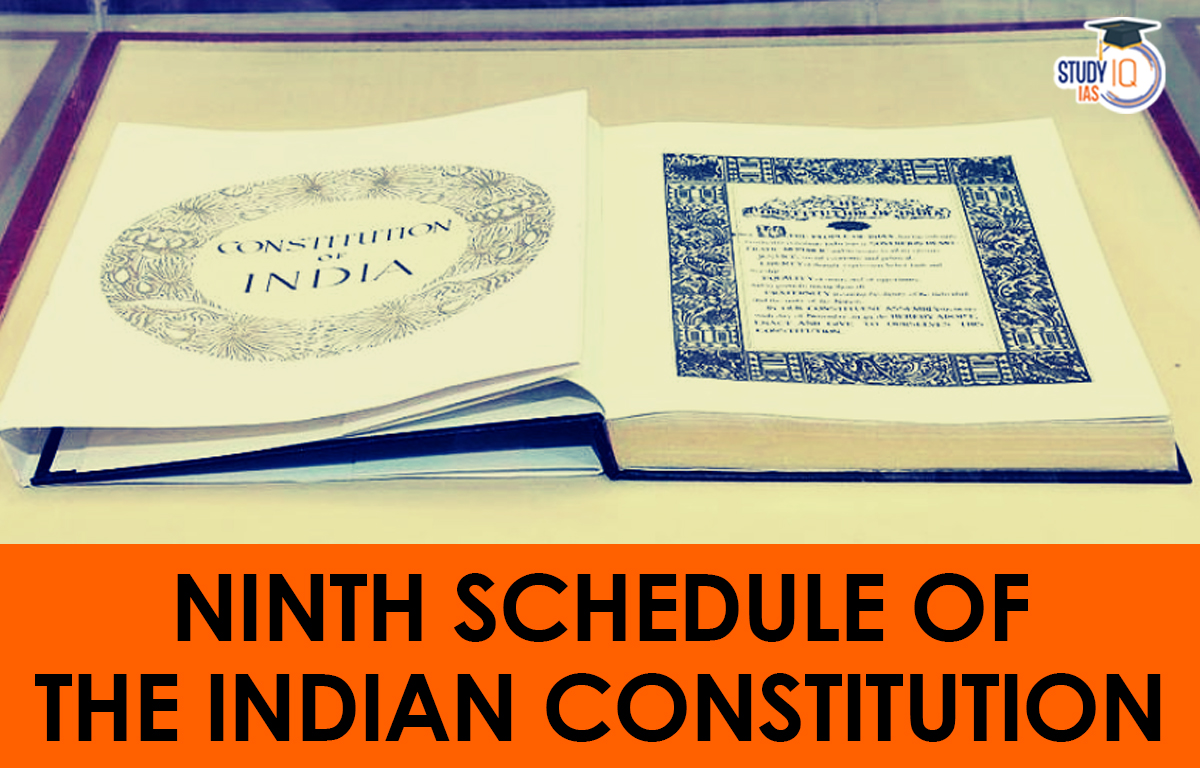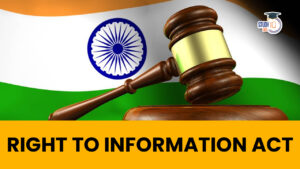Table of Contents
The Ninth Schedule of the Indian Constitution is a constitutional mechanism used to protect certain laws from judicial review, even if they violate Fundamental Rights. Originally introduced to safeguard land reform laws, the Ninth Schedule has now become central to debates around reservation policies and judicial accountability.
This article explains the origin, purpose, key provisions, landmark cases, and current relevance of the Ninth Schedule, particularly in light of the Chhattisgarh reservation case.
What is the Ninth Schedule?
The Ninth Schedule is a part of the Constitution that contains a list of laws (central and state) that are immune from judicial review. These laws cannot be challenged in courts for violating the Fundamental Rights guaranteed under Part III of the Constitution.
It was added by the Constitution (First Amendment) Act, 1951, along with Article 31A and Article 31B, to protect laws related to land reforms and the abolition of the Zamindari system.
| Aspect | Details |
|---|---|
| Introduction | The Ninth Schedule contains a list of central and state laws that cannot be challenged in courts for violating Fundamental Rights. |
| Added by | Constitution (First Amendment) Act, 1951 |
| Objective | To protect certain laws and regulations from being declared void on the grounds of violating Fundamental Rights, especially in the context of land and agrarian reforms. |
| Origin | Created through Article 31B; introduced along with Article 31A in 1951. |
| Article 31A | Protects categories of laws, especially related to land reform, corporate regulation, and property acquisition. |
| Article 31B | Shields specific laws listed in the Ninth Schedule from judicial review, even if they conflict with Fundamental Rights. |
| Primary Use | To protect land reform laws and laws abolishing the Zamindari system from legal challenge. |
| Judicial Limitation | After I.R. Coelho judgment (2007), laws added after April 24, 1973, can be reviewed if they violate the Basic Structure of the Constitution. |
Why is there a need to Include it in the Ninth Schedule?
- The 76% reservation breaches the 50 % ceiling set by the Supreme Court in the 1992 Indra Sawhney v Union of India verdict.
- However, placing legislation in the Ninth Schedule shields it from judicial scrutiny.
- Previously, the Tamil Nadu Backward Classes, Scheduled Castes and Scheduled Tribes (Reservation of Seats in Educational Institutions and of Appointments or Posts in the Services under the State) Act, 1993, reserved 69 % of the seats in colleges and jobs in the state government
The Objective of the Ninth Schedule
The main aim of the Ninth Schedule is:
- To ensure social and economic justice by protecting laws that support agrarian reform and uplift marginalized communities.
- To prevent the judiciary from striking down such laws as unconstitutional.
- To promote the Directive Principles of State Policy (DPSPs) over Fundamental Rights in specific contexts.
Constitutional Provisions for the 9th Schedule
Article 31 A
- It saves five categories of laws from being challenged and invalidated on the grounds of contravention of the fundamental rights conferred by Article 14 and Article 19.
- The five categories include:
- Acquisition of estates and related rights by the State;
- Taking over the management of properties by the State;
- Amalgamation of corporations;
- Extinguishment or modification of rights of directors or shareholders of corporations;
- Extinguishment or modification of mining leases.
- It also provides the guaranteed right to compensation in case of acquisition or requisition of private property by the state.
Article 31B
- It protects the acts and regulations included in the Ninth Schedule from being challenged and invalidated on the grounds of contravention of any of the fundamental rights.
- Specificity: While Article 31A extends protection to ‘classes’ of laws, Article 31B shields specific laws or enactments.
- Wider in scope: The scope of Article 31B is wider than Article 31A as it immunizes any law included in the Ninth Schedule from the Fundamental Rights (unlike Article 31A which protects only five categories).
- Retrospective in nature: If an act is held unconstitutional and thereafter is put under the 9th schedule, it will be considered as its part since its commencement.
- Current status: The First Amendment added 13 laws to the 9th Schedule. Subsequent amendments in various years have taken the number of protected laws to 284 currently.
- While most of the laws protected under the Schedule concern agriculture/land issues, the list includes other subjects.
Are Laws in the Ninth Schedule Immune from Judicial Review?
No, the immunity is not absolute.
After the I.R. Coelho judgment, any law inserted after April 24, 1973, can be reviewed by courts if:
- It violates the Basic Structure of the Constitution.
- It infringes upon Articles 14, 19, and 21 (Equality, Freedom, Life & Liberty).
Thus, while the Ninth Schedule provides protection, it cannot override core constitutional principles.
Criticism of the Ninth Schedule
- The Ninth Schedule shields laws from judicial review, even if they violate fundamental rights like Articles 14, 19, and 21.
- It has been misused by governments to protect unrelated or controversial laws.
- This undermines the doctrine of separation of powers by limiting judicial oversight.
- The I.R. Coelho (2007) verdict stated that post-1973 laws in the Ninth Schedule must follow the Basic Structure Doctrine.
- Arbitrary inclusion of laws without clear criteria reduces transparency.
- It weakens accountability by letting the legislature bypass judicial scrutiny.
- Laws affecting public interest are added without debate, harming democratic processes.
- Originally meant for land reforms, it’s now misused for political gain.
Current Relevance of the Ninth Schedule
- Reservation Demands: States like Chhattisgarh, Tamil Nadu, and Jharkhand seek to exceed the 50% reservation cap by placing laws in the Ninth Schedule.
- Challenge to 50% Cap: The 1992 Indra Sawhney case fixed a 50% ceiling on reservations; however, some states argue for exceptions based on unique socio-economic conditions.
- Judicial Oversight Post-1973: The I.R. Coelho (2007) judgment allows scrutiny of laws added after April 24, 1973, if they violate fundamental rights.
- Political Use: Governments attempt to use the Ninth Schedule to shield controversial laws from court challenges.
- Need for Balance: There is a growing debate on balancing social justice with constitutional integrity in today’s complex policy landscape.
Way Forward
- Ensure Judicial Scrutiny: Any law added to the Ninth Schedule should be subject to the Basic Structure Doctrine and fundamental rights review.
- Transparent Criteria: Define clear guidelines for the inclusion of laws in the Schedule to avoid misuse.
- Limit Scope: Restrict the Ninth Schedule to its original purpose—agrarian and land reforms, not political or populist moves.
- Parliamentary Oversight: Involve Parliamentary Committees and experts before adding any law.
- Stakeholder Consultation: Include civil society, legal experts, and affected communities in decision-making.
- Periodic Review: Conduct a review of existing laws in the Schedule to assess their necessity and constitutional validity.
- Promote Balanced Reservation Policies: Ensure affirmative action is inclusive yet rational, upholding both equity and merit.
Conclusion
The Ninth Schedule of the Indian Constitution remains one of the most powerful tools to safeguard laws from judicial intervention, especially those aimed at social upliftment. However, its unregulated use can potentially undermine Fundamental Rights and disturb the balance between different parts of the Constitution.


 Right To Information Act, Objective, Fea...
Right To Information Act, Objective, Fea...
 Indian Councils Act 1861, History, Provi...
Indian Councils Act 1861, History, Provi...
 NITI Aayog Report on India’s Hand and ...
NITI Aayog Report on India’s Hand and ...





















